Exploring the World of Abstract Strategy Games

Delve into the intriguing realm of abstract strategy games, a world where chance is minimized, and strategic skills reign supreme. From ancient classics such as Go and Chess to modern masterpieces, these games offer a pure test of intelligence, planning, and foresight. Through strategic maneuvering and tactical planning, players engage in intellectual duels that have captivated minds for centuries. Join us as we explore the depths and diversity of abstract strategy games, understanding their appeal, evolution, and the unique challenges they present.

The Timeless Classics: Go, Chess, and Beyond
The timeless classics of abstract strategy games, such as Go, Chess, Checkers (Draughts), and Mancala have fascinated players for centuries, if not millennia. These games are known for their deep strategic depth, complex gameplay, and rich historical backgrounds.
Go (Baduk/Weiqi)
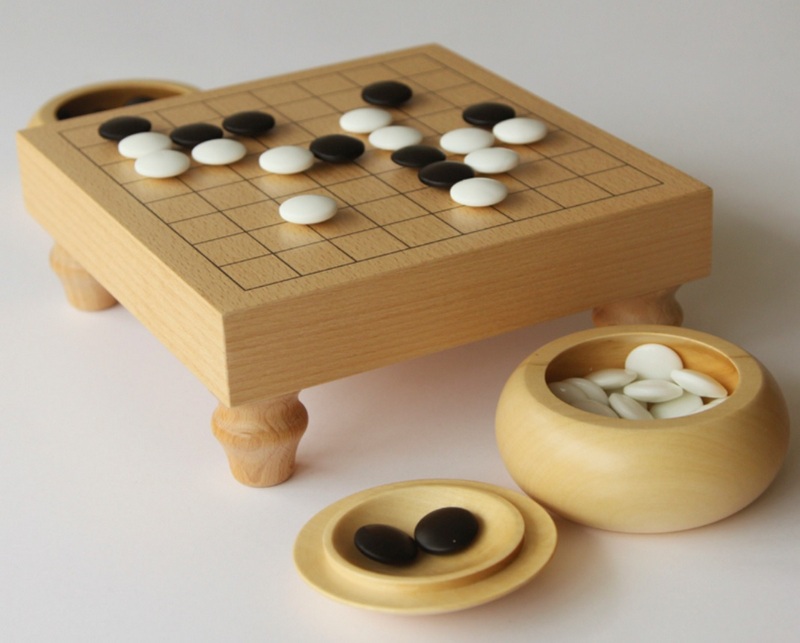
Originating over 4,000 years ago in China, Go is considered to be the oldest board game continuously played to this day. This game is deeply embedded in East Asian cultures, especially in China, Korea, and Japan, where it’s known as Weiqi, Baduk, and Go, respectively. The board, marked with a 19×19 grid, using black and white stones, offers a seemingly simple setup for a game of an unparalleled strategic depth. The goal is to surround more territory than your opponent, leading to complex battles and strategic planning across the board. This game’s complexity can be illustrated by the fact that there are an estimated 10^170 legal board positions, far exceeding the number of atoms in the observable universe.
Chess

Chess, with its origins traced back to 6th-century India, known then as Chaturanga, has since evolved into a global phenomenon that symbolizes strategic thinking and intelligence. The 8×8 square grid, with six distinct piece types on each side, offers a finite yet vast universe of 10^123 possible game situations. This staggering complexity has made Chess not only a game but also a significant subject of study in the fields of mathematics, computer science, and artificial intelligence. The game’s historical depth and the strategic demand it places on players have cemented its place as a hallmark of intellectual acumen across cultures and epochs.
Checkers (Draughts)
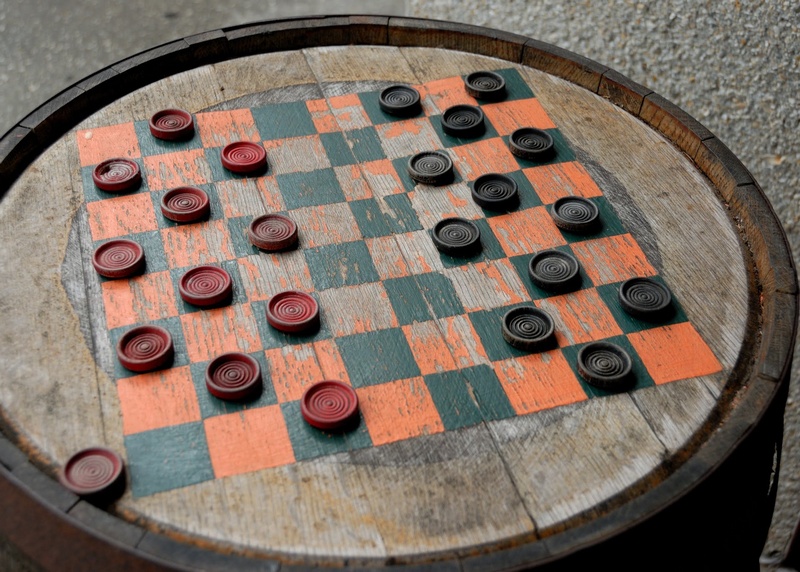
Checkers, also known as Draughts, as it’s known in the United Kingdom, is believed to have originated from the ancient Egyptian game Alquerque. In the 11th century, the game transitioned to the 12×12 board used today in Spain. Checkers eventually evolved into the 8×8 board that we are familiar with. Despite its simpler rules when compared to Chess or Go, Checkers demands strategic foresight and tactical skills, making it both accessible yet challenging. The game reached a significant milestone in computational history when, in 2007, the game of Checkers was solved: with perfect play from both sides, the game would always end in a draw.
Mancala

Mancala is a family of board games that are played worldwide. The origins of the game are possibly from ancient Africa or the Middle East. In Mancala, there is a board with rows of holes, each filled with a certain amount of seeds or stones. The aim is to capture more of these stones than the opponent. Mancala games have been noted for their ability to develop counting and strategic thinking skills. They also have a historical significance as a tool for social interaction and decision-making. Despite their ancient origins, Mancala continues to be popular, reflecting its adaptability and universal appeal.
These games not only provide engaging pastimes, but also act as reflective mirrors of the cultures that inspired them. They have been used for more than just entertainment, including in military strategy training and mathematical analysis. In fact, they have even been gifted as diplomatic gifts between nations. Their long history demonstrates the depth of human intellectual curiosity, as well as our enduring fascination with strategies, competitions, and the elegance of abstract games.
Modern Marvels: The Evolution of Abstract Strategy
The evolution of modern abstract strategy games is a fascinating journey that takes us from the traditional board games like Go and Chess, which have been played for centuries. These innovative titles captivate today’s players, building upon the classical foundations and introducing fresh mechanics, engaging themes, and dynamic gameplay. Games like Hive, Santorini, and Azul are examples of this evolution, bringing something unique to the abstract strategy genre.
Hive

Hive is a game that does not use a board. Instead, it uses hexagonal tiles that represent different insects, each with its own unique movement patterns. The game was introduced in 2001 by John Yianni. Hive requires spatial awareness and strategic planning, as players try to surround their opponents’ queen bee while protecting their own. What makes Hive stand out is its simplicity of concept, combined with the deep strategic possibilities. Each game is a new challenge to solve, and its portability and quick set-up time have contributed to its popularity amongst modern players.
Santorini
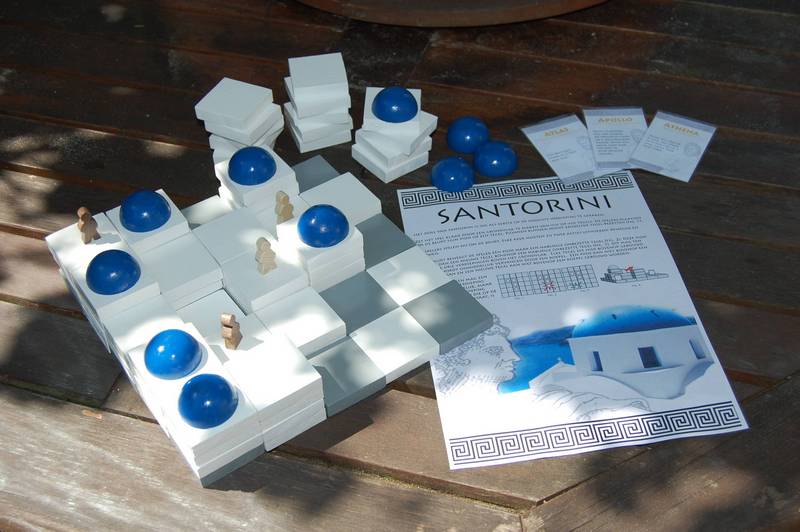
Santorini, created by Gordon Hamilton and released in 2016, revolutionizes the abstract strategy genre with its 3D board, which represents the buildings on the titular Greek island. Players assume the roles of Greek Gods, using workers to construct towers. The goal is to transport a worker to the third floor of a tower, but opposing players can cover towers with domes to obstruct this process. The introduction of god-like powers adds a layer of complexity and variety, ensuring that every game is unique. Santorini’s strikingly visual board and pieces, combined with its mythical theme, have made it a popular choice for both casual and experienced players.
Azul
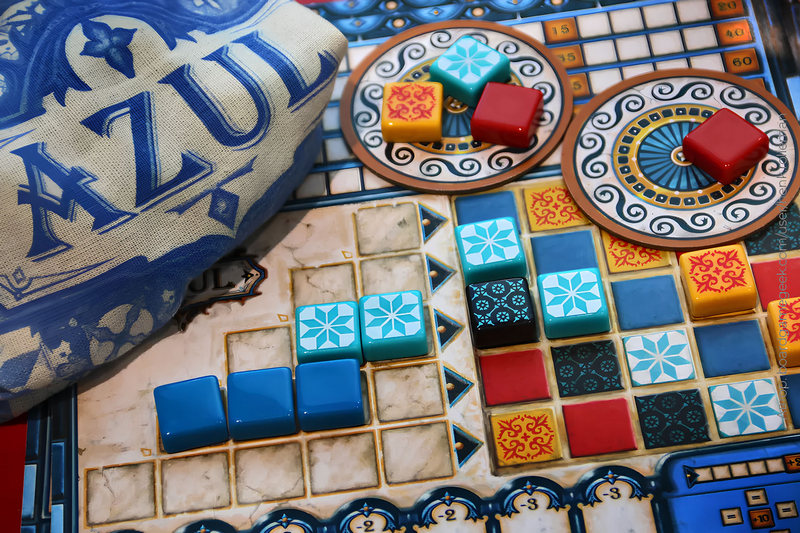
Azul, developed by Michael Kiesling and released in 2017, combines abstract strategy with the world of tile drafting and pattern creation. Players take on the role of artisans decorating the walls of the Royal Palace in Evora with Moorish tiles. They score points based on how these tiles are arranged in relation to one another on their board, rewarding careful planning and strategic positioning. The success of Azul is attributed to its simple but engaging gameplay, its beautiful components, and the depth of strategy that it offers. These qualities have earned the game numerous awards, including the prestigious Spiel des Jahres.
The introduction of these modern masterpieces has significantly contributed to the revival of abstract strategy games. These games have made the genre more accessible and appealing to a wider audience. Through their innovative designs, captivating themes, and engaging gameplay, they have not only honored the legacy of their predecessors, but have also set new standards for what abstract strategy games can provide. They exemplify the power of creativity and innovation to breathe new life into an age-old genre, ensuring it will continue to be a part of the world of tabletop gaming for many years to come.
Analyzing the Appeal: Why We Play Abstract Strategy Games

The allure of abstract strategy games lies not only in the thrill of competition, but also in their profound influence on the human mind. These games foster a range of cognitive benefits and social skills that extend far beyond the limits of the game board.
The Intellectual Stimulus
Abstract strategy games provide a mental gym for players, providing rigorous training for cognitive functions. They involve deep strategic thinking and constant analysis of the current state of play. Players predict opponents’ moves and formulate long-term plans, enhancing their critical thinking skills. These skills are crucial for problem-solving in real-world situations, such as those encountered in chess or go, which mirror the complexities and foresight needed in planning, business strategy, and software development.
Memory and Concentration
Regular engagement with strategy games has been shown to have a positive impact on memory. Players need to remember the rules and recall previous games in order to avoid making the same mistakes, and they must also track the moves of their opponents. This active memory practice strengthens pathways in the brain, contributing to improved memory retention over time. Additionally, the focused attention required to anticipate and counter opponents’ strategies can enhance players’ concentration levels. This makes them better able to focus on tasks outside of gaming.
Strategic Flexibility and Mental Agility
Adapting to dynamic environments in games like Hive and Azul requires a high level of mental agility. Players need to be able to change strategies on the spot, which translates to increased flexibility in their daily lives. Facing unexpected situations and successfully navigating through them can improve one’s capacity to adapt to change and think quickly.
Social Interaction and Emotional Intelligence
In addition to the cognitive benefits, abstract strategy games play a significant role in social interaction. They offer a platform for healthy competition, teamwork, and communication, promoting relationships and building community. The social aspect of gaming helps develop emotional intelligence, as players learn to read other players’ intentions and manage their own emotions during high and low points of the game. This also includes learning about sportsmanship, which is essential for cooperative play. Games that involve teamwork or multi-player interaction further enhance these skills by teaching players how to work together effectively and communicate strategically.
The Joy of Mastery and Achievement
Finally, the sense of satisfaction derived from mastering a complex game or outsmarting an opponent taps into the innate human desire for achievement. This sense of achievement is a powerful motivator and contributes to a player’s sense of self-worth and confidence. The mental challenge and subsequent success experienced in these games provides a fulfilling sense of progression and personal growth.
In conclusion, abstract strategy games offer a unique blend of intellectual challenges, psychological benefits, and social interactions. These games are not only entertaining, but also contribute significantly to cognitive development, emotional intelligence, and social skills. They are therefore a valued part of human culture and education.
Choosing Your Challenge: A Guide to Selecting Abstract Strategy Games

When choosing an abstract strategy game, it is crucial to consider complexity, playing time, and the number of players in order to ensure that the game meets your expectations and fits your gaming environment. This detailed guide will help you select the right challenge.
Complexity: Matching Game Depth with Player Experience
Abstract strategy games range from exceedingly simple to profoundly complex. Beginners may prefer games with fewer rules and a more straightforward objective, such as Hive, in which the goal is simply to surround the enemy’s queen. On the other hand, experienced players may seek the deeper strategic layers of games such as Go, where each placed piece adds to the complexity of the game.
– For Beginners: Look for games with straightforward rules and quick to grasp objectives. Games like Hive or Santorini, which offer clear goals and limited types of moves, can be ideal starters.
– For Advanced Players: Games that offer a vast array of strategies and outcomes, such as Go or Chess, can be more engaging. The complexity of these games provides a richer, more rewarding experience for those willing to delve into their depths.
Playing Time: Fitting the Game into Your Schedule
The duration of a game can vary greatly depending on the specific abstract strategy game. Some games are quick, lasting only a few minutes, while others can be much longer, extending for hours.
– Short Sessions: If you’re looking for games that fit into a tight schedule, consider titles like Onitama and Patchwork. These games typically conclude within 15-30 minutes, offering a satisfying yet concise experience.
– Longer Engagements: For players who enjoy settling into a strategic duel, games like Chess or Go can offer matches that last anywhere from an hour to several hours, depending on the players’ skill levels and thought processes.
Number of Players: Tailoring to Your Group
While many abstract strategy games are designed for two players and offer a head-to-head duel, there are also games that can accommodate larger groups and offer team play.
– Two Players: The majority of abstract strategy games, like Chess, Go, and Hive, are designed for two, offering a direct and intimate strategic battle.
– Multiple Players: Games like Azul and Santorini can accommodate more players, usually up to four. This can change the dynamic significantly, introducing elements of negotiation, alliances, and the need to anticipate multiple opponents’ moves.
Personal Preferences and Themes

In addition to these practical considerations, a personal interest in the game’s themes, aesthetics, and emotional impact can significantly enhance the experience. Traditional games like Chess and Go, with their centuries-old history and classic aesthetic, offer a timeless appeal. However, modern games such as Azul with its beautiful mosaic tiles provide a visual and strategic treat that is unique and engaging.
Choosing the right strategy game is a balancing act between personal preferences and those of those you play with. Whether you prefer the simplicity and elegance of classical games or the innovative mechanics of modern ones, there is a game for everyone. By starting with these guidelines and exploring, experimenting, and finding games that challenge and engage you the most, you can find the perfect game for you.
Conclusion
Abstract strategy games are monuments to human ingenuity and creativity, presenting endless challenges that have spanned centuries and cultures. Whether from ancient times or modern times, these games continue to captivate and engage players worldwide, offering not just entertainment, but a platform for intellectual development and social connection. As we explore the vast landscape of abstract strategy games, we discover not only a testimony to the past, but also a living and evolving tradition of strategic thinking. This approach provides a comprehensive overview of the genre, honoring its rich history while embracing the innovative developments that continue to energize it.

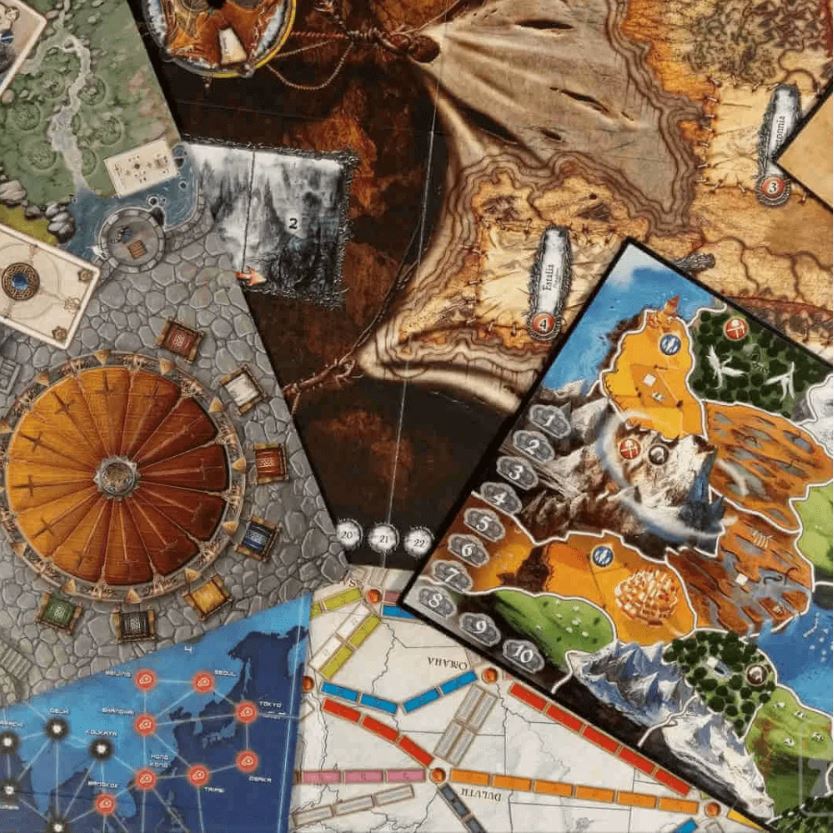
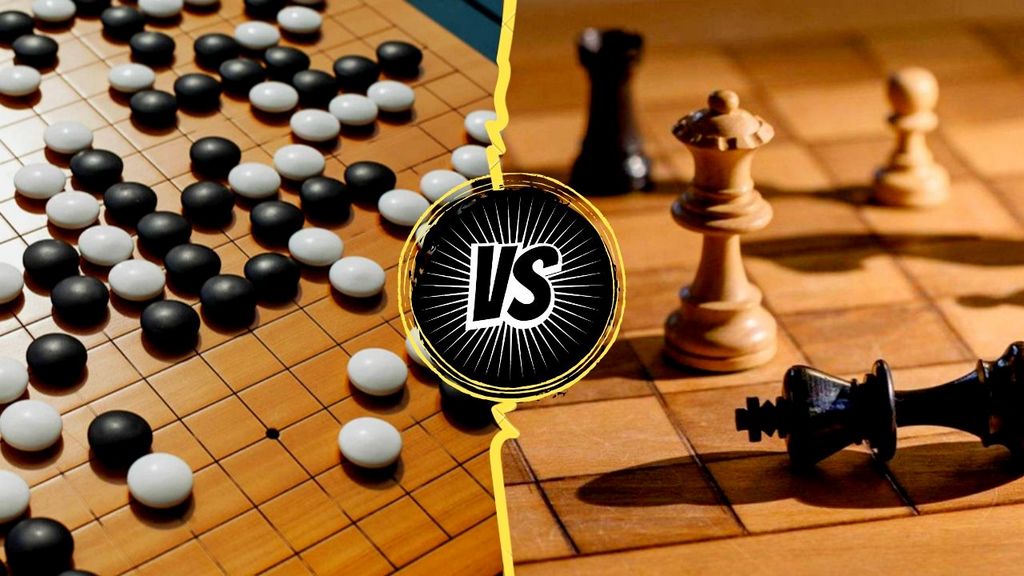


Leave a comment